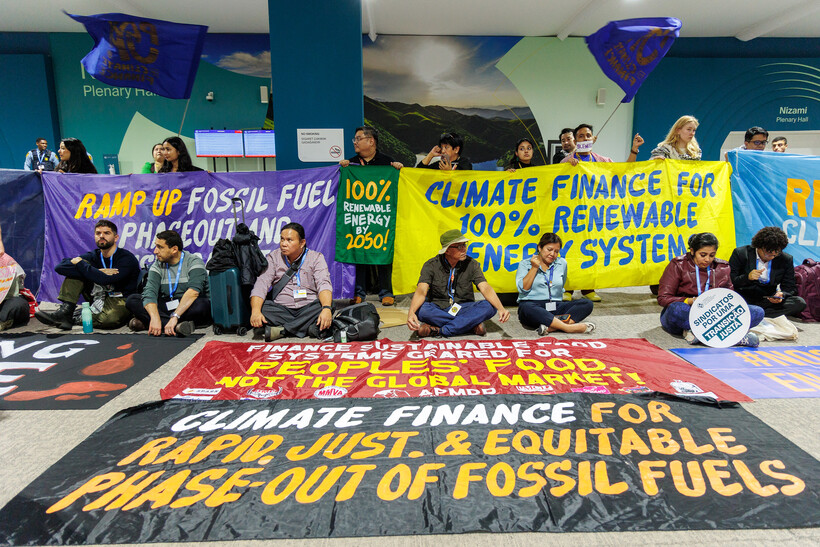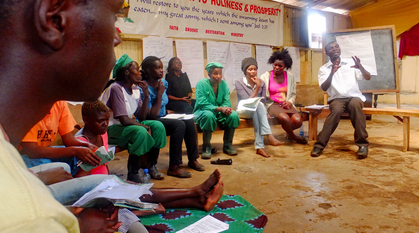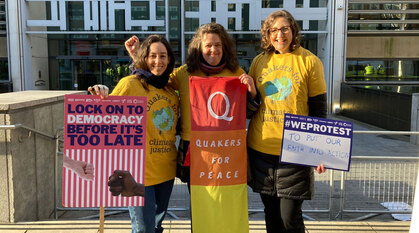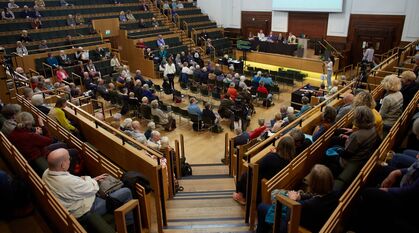A clarion call for climate justice
Johan Cavert, Programme Assistant for the Human Impacts of Climate Change at the Quaker United Nations Office, reflects on his first experience of United Nations climate change talks.

Arriving at the UN climate change talks (COP29) in Azerbaijan, a clarion of trumpets and beating drums echoed from large speakers, heralding the entrance to the conference complex. Listening each morning reminded me of the insistent and repeated demands from civil society and observers calling for just and equitable climate finance.
At the same time, I was struck by the large temporary tent city constructed for the over 60,000 attendees who traversed the conference halls. Surrounded on all sides by artificial construction, it was hard not to notice the ways in which – literally and figuratively – negotiations in Baku resembled a circus. Pageantry is at times necessary and the symbolism of the United Nations Conference of the Parties (COP) cannot be denied. Nonetheless, bread and circuses will no longer be sufficient for those seeking justice.
A concerning COP
A clear call to increase financing for the most vulnerable was sounded repeatedly at COP29. It frequently went unheeded. Throughout two weeks of heated negotiations, states remained at loggerheads over the primary issue being discussed – how much money to commit for the New Collective Quantified Goal for climate finance (NCQG).
Developing countries demanded over US$1.3 trillion in grants be paid each year by developed countries. For their part, developed countries avoided committing to any numbers until the eleventh hour, and only then proposed a figure and language that was highly disappointing. Well more than 24 hours overtime, states adopted a text that failed to advance significant action addressing the climate crisis.
In addition to this being my first time attending COP, it was also my first experience observing international negotiations. I left Baku inspired by the global solidarity and commitment displayed by a wide array of individuals and organisations. At the same time, I came away discouraged by the apparent lack of urgency in the multilateral process.
I was not the only participant whose faith in global governance came away bruised. Many speakers underlined that this was the 29th iteration of annual negotiations and yet increases of carbon emissions continue. Amidst proceedings, a group of distinguished global leaders released an open letter which called into question the hosting process, given the past two COPs have been led by economies highly dependent on fossil fuels. Azerbaijan's COP Presidency was already a focus of concern before the conference began, due to a report showing how the Presidency saw the event as an opportunity to sign oil and gas deals. Modernist skyscrapers along Baku's coast tower over the oil fields of the Caspian sea, displaying the connection between the country's economic wealth and its longstanding reliance on fossil fuels. President Ilham Aliyev said the quiet part out loud when he stated that Azerbaijan's fossil fuel resources are "a gift from God".
Inspiring action within a flawed system
Azerbaijan was also criticised for its rights record and unjust detention of government critics and environmental human rights defenders. I was grateful to participate in the human rights and climate change working group which worked to publicise demands for a more open and inclusive space for civil society. Actions at the conference were restricted to pre-assigned spaces and detailed requirements were imposed on messaging and speech.
Having been refused the chance to sing or chant during one action, participants instead hummed together in a creative act of melodic resistance. The limited number of delegate slots available and the difficulty in travelling to Baku highlighted the impact of those in attendance. At the same time, it was inspiring to realise that those on the ground were just the tip of the iceberg of a global movement.
In the midst of insufficient political will, we must continue to work for meaningful progress from international negotiations while remaining clear that national action and advocacy are essential to international success. The circus atmosphere that at times pervaded Baku only underlines the importance of speaking honestly about the role power and influence play in perpetuating systems of injustice.
A Quaker presence at COP is an important witness that care for creation involves living sustainably and in just relationship with the earth. The call for climate justice and equitable financing has been broadcast clearly. It must be echoed and acted on.


